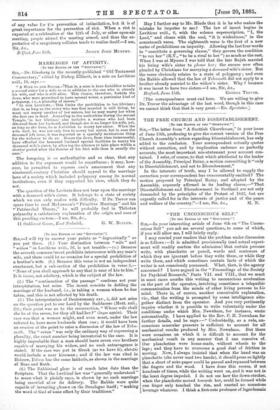MARRIAGES OF AFFINITY. [To THE EDITOR OF ma "SPECTATOR."]
Sut,—Dr. Ginsburg in the recently-published "Old Testament Commentary," edited by Bishop Ellicott, in a note on Leviticus xviii., 18, says :—
"A Wive TO HER Stsvaa.-2That is, a man is here forbidden to take a second sister for a wife to or in addition to the one who is already his wife, and who is still alive. This clause, therefore, forbids the Jews, who were permitted to have several wives, a particular kind of polygamy, i e., a plurality of sisters." "IN HER LIFETIME.—Tbis limits the prohibition to her lifetime; that is, as long as the sister who was first married is still living, he must not marry another of her sisters, but he may marry her when the first one is dead. According to the authorities during the second Temple, 'in her lifetime,' also includes a woman who had been divorced from her husband, and though she is no longer his wife, yet, as long as she lives, he is forbidden to marry her sister. When the wife died, he was not only free to marry her sister, but in case the deceased left issue, it was regarded as a specially meritorious thing for the widower to do so. Hence the Jews, from time immemorial, have afforded the bereaved husband special facilities to marry his deceased wife's sister, by allowing the alliance to take place within a shorter period after the demise of his first wife than is usually the case."
The foregoing is FO authoritative and so clear, that any addition to the argument would be superfluous ; it may, however, be permitted to express one's amazement that any nineteenth-century Christian should appeal to the marriage laws of a society which included polygamy among its normal institutions, even if they supported his view, which they do not.
The question of the Levirate does not bear upon the marriage with a deceased wife's sister. It belongs to a state of society which we can only realise with difficulty. If Dr. Trevor can spare time to read McLennan's "Primitive Marriage" and his "Patriarchal Theory," be will probably find in Tbibetan polyandry a satisfactory explanation of the origin and uses of this puzzling custom.—I am, Sir, &c., 11 Oakhurst Grove, East Dulwich. G. W. BULLER.


































 Previous page
Previous page